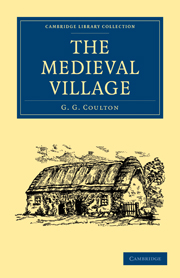Book contents
- Frontmatter
- GENERAL PREFACE
- AUTHOR'S PREFACE
- Contents
- LIST OF ILLUSTRATIONS
- ABBREVIATIONS AND AUTHORITIES
- CHAPTER I THE OPEN ROAD
- CHAPTER II VILLAGE DEVELOPMENT
- CHAPTER III A FEW CROSS-LIGHTS
- CHAPTER IV A GLASTONBURY MANOR
- CHAPTER V THE SPORTING CHANCE
- CHAPTER VI BANS AND MONOPOLIES
- CHAPTER VII THE MANOR COURT
- CHAPTER VIII LIFE ON A MONASTIC MANOR
- CHAPTER IX FATHERLY GOVERNMENT
- CHAPTER X THE LORD'S POWER
- CHAPTER XI EARLIER REVOLTS
- CHAPTER XII MONKS AND SERFS
- CHAPTER XIII THE CHANCES OF LIBERATION
- CHAPTER XIV LEGAL BARRIERS TO ENFRANCHISEMENT
- CHAPTER XV KINDLY CONCESSIONS
- CHAPTER XVI JUSTICE
- CHAPTER XVII CLEARINGS AND ENCLOSURES
- CHAPTER XVIII CHURCH ESTIMATES OF THE PEASANT
- CHAPTER XIX RELIGIOUS EDUCATION
- CHAPTER XX TITHES AND FRICTION
- CHAPTER XXI TITHES AND FRICTION (CONTINUED)
- CHAPTER XXII POVERTY UNADORNED
- CHAPTER XXIII LABOUR AND CONSIDERATION
- CHAPTER XXIV THE REBELLION OF THE POOR
- CHAPTER XXV THE REBELLION OF THE POOR (CONTINUED)
- CHAPTER XXVI THE DISSOLUTION OF THE MONASTERIES
- CHAPTER XXVII CONCLUSION
- APPENDIXES
- POSTSCRIPTS
- INDEX
- Plate section
CHAPTER XI - EARLIER REVOLTS
Published online by Cambridge University Press: 06 December 2010
- Frontmatter
- GENERAL PREFACE
- AUTHOR'S PREFACE
- Contents
- LIST OF ILLUSTRATIONS
- ABBREVIATIONS AND AUTHORITIES
- CHAPTER I THE OPEN ROAD
- CHAPTER II VILLAGE DEVELOPMENT
- CHAPTER III A FEW CROSS-LIGHTS
- CHAPTER IV A GLASTONBURY MANOR
- CHAPTER V THE SPORTING CHANCE
- CHAPTER VI BANS AND MONOPOLIES
- CHAPTER VII THE MANOR COURT
- CHAPTER VIII LIFE ON A MONASTIC MANOR
- CHAPTER IX FATHERLY GOVERNMENT
- CHAPTER X THE LORD'S POWER
- CHAPTER XI EARLIER REVOLTS
- CHAPTER XII MONKS AND SERFS
- CHAPTER XIII THE CHANCES OF LIBERATION
- CHAPTER XIV LEGAL BARRIERS TO ENFRANCHISEMENT
- CHAPTER XV KINDLY CONCESSIONS
- CHAPTER XVI JUSTICE
- CHAPTER XVII CLEARINGS AND ENCLOSURES
- CHAPTER XVIII CHURCH ESTIMATES OF THE PEASANT
- CHAPTER XIX RELIGIOUS EDUCATION
- CHAPTER XX TITHES AND FRICTION
- CHAPTER XXI TITHES AND FRICTION (CONTINUED)
- CHAPTER XXII POVERTY UNADORNED
- CHAPTER XXIII LABOUR AND CONSIDERATION
- CHAPTER XXIV THE REBELLION OF THE POOR
- CHAPTER XXV THE REBELLION OF THE POOR (CONTINUED)
- CHAPTER XXVI THE DISSOLUTION OF THE MONASTERIES
- CHAPTER XXVII CONCLUSION
- APPENDIXES
- POSTSCRIPTS
- INDEX
- Plate section
Summary
The English peasant was seldom or never so ill off as his continental brethren. There were many reasons for this; the main, no doubt, was our more orderly government and steadier growth in freedom, with which our military and police system was inseparably bound up. I have expressed elsewhere my belief that much of our prosperity in the Middle Ages was due to the fact that here, more truly than in any other great country, every man was his own soldier and his own policeman. As Dr John Moore noted in the Switzerland of 1779, one cannot permanently overtax a population in which every man bears arms. The “Grande Ordonnance” of Charles VII fixed upon France, for more than three centuries, the double curse of a mercenary army and irresponsible taxation. It was the king's business to keep soldiers and to raise taxes; the king's business and nobody else's. This bargain enabled Charles VII to drive out the English invader; but it left the nation helpless against despotism until 1789, while the two freest countries in Europe were Great Britain and Switzerland, each with its own national militia. While our Tudors, with a mere handful of a bodyguard, were obliged to consult the will of the nation, their French contemporaries went on from tyranny to tyranny with the support of a large standing army, and the French peasant suffered all that we have seen in Delisle's description.
- Type
- Chapter
- Information
- The Medieval Village , pp. 121 - 139Publisher: Cambridge University PressPrint publication year: 2010First published in: 1925



